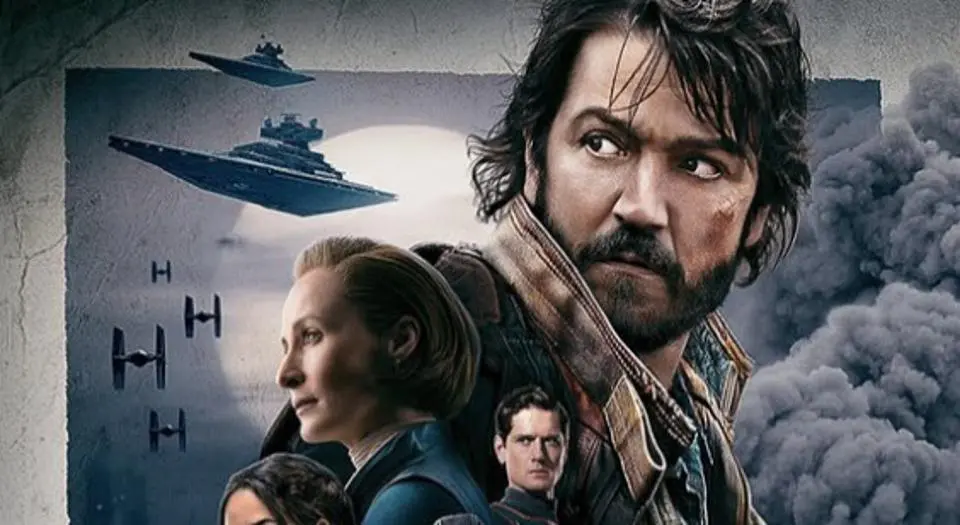Summary
A fantastic episode proves that Andor might be the best piece of Star Wars media ever.
“Never more than twelve.” Those were the words that had Andy Serkis trending after Andor Season 1, Episode 9, and they’ve since become symbolic of how Star Wars media can do big, crowd-pleasing moments without relying on nostalgia.
He was talking about how many guards are on each level of Narkina-5, the labor prison where he and Cassian have been sentenced for some vague, unspecified crimes, and from which they learned last week that nobody ever escapes. Twelve guards scarcely seem like enough to control 5000 prisoners. As “One Way Out” reveals, it isn’t.
But the escape from Narkina-5 relies on what the Imperial facility has been designed to extinguish – hope. The point of the prison is that it seems so well-maintained and deadly that nobody would ever consider a breakout.
They’d rather do what Kino has spent his time doing – being model prisoners, working hard, and keeping their heads down in the hopes of reaching the end of their sentence. The revelation that nobody ever really leaves changes all that. The illusion has been shattered. And suddenly, the seams are showing.
“One Way Out” does a phenomenal job of showing how Cassian’s observations and planning coalesce with what Rhasiv revealed and how that news brings about a change in perspective for Kino.
We know that the guards are weakest when they’re bringing in a new prisoner, which they’re going to be doing imminently in the wake of Ulaf’s death. We know that the facility is understaffed and that its deadly competence – think of Cassian revealing that the rooms aren’t being constantly monitored last week – is an illusion.
We know that whatever is being built on Narkina-5 is important to the Empire and that they will find any way possible to keep the prisoners building it. Everything fits. It’s escape or die. There is, as the episode title implies, only one way out.
Like the raid on the Aldhani garrison, the prison escape takes center stage, and the MVP of the entire arc is, without question, Andy Serkis’s Kino. Serkis, primarily known for all-time-great work as unrecognizable digital creations, is superb here playing a man enduring a personal crisis, trying to reconcile a belief he instinctively knows was naïve with the seemingly impossible odds of rebelling against it.
When he really gets going, delivering a rousing speech over Narkina-5’s communications system, he is dynamite. I was with him every step of the way.
It feels easy. And it is, in a way, since the whole point is that the Empire was never suitably equipped to prevent an escape in the first place – their success was dependent on the prisoners just never realizing it. This is how totalitarian regimes work; they’re built on suppressing hope, communication, education, and understanding so that the people they oppress can’t organize and rebel.
There were more slave rebellions in the Caribbean because the enslaved people were purchased in larger groups and could communicate in the same language. Here, all it takes is for the prisoners to learn that they’re never getting out to inspire them to get out right then and there.
But Kino doesn’t get out. Narkina-5 is an isolated facility built in the middle of the ocean, and he can’t swim. As the prisoners triumphantly leap to safety, Kino stays behind, and Cassian is knocked into the water along with them, leaving him to his fate. That isn’t confirmed in “One Way Out”, but it’s hard to imagine it’ll be anything positive, especially after the integral role he played in the breakout.
Meanwhile, the Empire has other things to be worrying about. The ISB is riding high on entrapping Kreegyr, but one of their number, Lonni, is playing both sides. We see him meet with Luthen at the end of the episode, which gives Stellan Skarsgård the opportunity to try and steal the spotlight from Serkis – and he comes close, even if he doesn’t quite get there. But the script exposes layers to the Luthen character that blur the lines between good and evil, light and dark, much more than Star Wars is typically inclined to do.
That murkier morality is central to the very idea of the rebellion, to that notion that some, like Lonni, who’re embedded in important positions of influence, have more long-term value than even many others, innocent though they may be. Lonni has been informing on the Empire for a long time, and can’t take the stress anymore. But what else can he do? How can he walk away, abandon his post, when the Empire won’t let him, and he has a greater obligation anyway. The sacrifices must continue.
As Cassian says earlier in the episode, and as Kino later repeats to inspire the prisoners, it’s either die fighting back or die doing what the Empire wants of you. Either way, you end up dead.
And there’s one more thing to consider while we’re on the subject of sacrifices. Last week, we learned that Mon Mothma was having to compromise by getting into bed – not literally, but financially – with Davo Sculdun, a smug Chandrilan banker who can help her move funds around the Empire under the guise of a charitable foundation. She knew he was slimy, but she didn’t quite realize how much.
But it becomes clear when Davo claims not to want a percentage of the money in exchange for his services, but a favor – another invite to Coruscant for him and his teenage son, obviously in the hopes of him meeting Mon’s 13-year-old daughter, Leida.
It isn’t said explicitly – Davo even outright denies he’s seeking an arranged marriage – but the implication is pretty clear. Chandrilan marital customs being what they are, and those having been leadingly mentioned earlier in the conversation, it’s obvious what Davo is doing. And it’s equally obvious that Mon might have to give him what he wants in order to continue funding the rebellion.
Andor is, frankly, as good as Star Wars has ever been, and this episode, which caps off an arc of bangers, proves just how tremendously written and performed the show really is.
Read More: Andor Season 1, Episode 11 Recap




